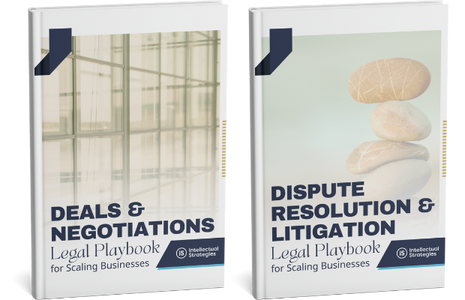FREQUENTLY ASKED QUESTIONS
What is alternative dispute resolution (ADR)?
ADR includes methods like mediation and arbitration that allow businesses to resolve disputes outside of court, often more privately, quickly, and cost-effectively.
Is ADR legally binding?
Arbitration can be legally binding if agreed upon in advance. Mediation results in a binding agreement if both parties sign a settlement.
When should a startup use ADR instead of litigation?
Use ADR when you want to resolve a dispute quickly, preserve business relationships, or avoid the costs and delays of court.
What types of disputes can be resolved through ADR?
Common examples include contract disputes, co-founder disagreements, vendor conflicts, IP issues, and partnership fallouts.
What’s the difference between mediation and arbitration?
Mediation is a facilitated negotiation with a neutral party; arbitration is a private trial where a third party makes a binding decision.
How long does ADR take compared to litigation?
ADR typically takes weeks to a few months. Litigation can take a year or more. ADR is often 60–90% faster.
Is ADR confidential?
Yes. Mediation and arbitration are private processes, unlike public court cases. This helps protect your reputation and business interests.
How much does ADR cost?
Costs vary but are generally far less than litigation. We offer flat-fee representation and transparent pricing.
Can I include ADR in my contracts?
Yes, and you should. Many businesses use mediation or arbitration clauses to manage risk and avoid court battles.
What’s your role during mediation or arbitration?
We help you prepare, represent your interests during the session, and negotiate fair, enforceable outcomes.
What if the other party refuses ADR?
If there’s no agreement to use ADR, you may need to file a lawsuit. We help assess strategy and legal leverage in those cases.
Do I need a lawyer for mediation?
It’s not legally required, but strongly recommended. We ensure you don’t miss key legal risks or sign an unfair settlement.
What if a settlement is reached—how is it enforced?
We draft or review the settlement agreement and ensure it’s enforceable under applicable laws.
Can ADR work in disputes involving IP or technology?
Yes. ADR is often used to resolve SaaS licensing disputes, co-development issues, and trademark conflicts quickly and privately.
What if the ADR process fails?
If resolution isn’t reached, we can pivot to litigation and bring forward the groundwork already prepared.










